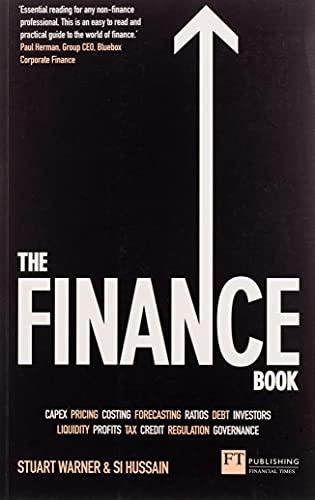Question
Parker Products manufactures a variety of household products. The company is considering introducing a new detergent. The company's CFO has collected the following information about
Parker Products manufactures a variety of household products. The company is considering introducing a new detergent. The company's CFO has collected the following information about the proposed product. (Note: You may or may not need to use all of this information, use only the information that is relevant.)
| The project has an anticipated economic life of 3 years. | |
| The company will have to purchase a new machine to produce the detergent. The machine has an up-front cost (t = 0) of $2.1 million. The machine will be depreciated on a straight-line basis over 3 years (that is, the company's depreciation expense will be $700,000 in each of the three years (t = 1, 2, and 3). The company anticipates that the machine will last for three years, and that after four years, its salvage value will equal zero. | |
| If the company goes ahead with the proposed product, it will have an effect on the company's net operating working capital. At the outset, t = 0, inventory will increase by $600,000 and accounts payable will increase by $220,000. At t = 3, the net operating working capital will be recovered after the project is completed. | |
| The detergent is expected to generate sales revenue of $3 million the first year (t = 1), $4 million the second year (t = 2), and $5 million the third year (t = 3). Each year the operating costs (not including depreciation) are expected to equal 50 percent of sales revenue. | |
| The company's interest expense each year will be $200,000. | |
| The new detergent is expected to reduce the after-tax cash flows of the company's existing products by $400,000 a year (t = 1, 2, and 3). | |
| The company's overall WACC is 12 percent. However, the proposed project is riskier than the average project for Parker; the project's WACC is estimated to be 13 percent. | |
| The company's tax rate is 40 percent. | |
|
|
|
Estimate the project net cash flows. Make sure to put the cash flows in order: CF0 in box 1, CF1 in Box 2, CF2 in Box 3, etc. Round it to a whole dollar, and do not include the $ sign. In box 5 (last one), compute the project's NPV. Round it to a whole dollar, and do not include the $ sign.
Step by Step Solution
There are 3 Steps involved in it
Step: 1

Get Instant Access to Expert-Tailored Solutions
See step-by-step solutions with expert insights and AI powered tools for academic success
Step: 2

Step: 3

Ace Your Homework with AI
Get the answers you need in no time with our AI-driven, step-by-step assistance
Get Started


